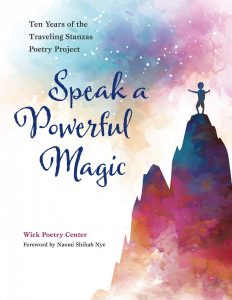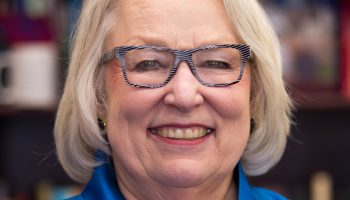 Young poets at Seville Intermediate School in Seville, Ohio, describe joy as “perfect,” “pouncing” and “purple.”
Young poets at Seville Intermediate School in Seville, Ohio, describe joy as “perfect,” “pouncing” and “purple.”
It’s just one example of the communal creative energy that fills the book, Speak a Powerful Magic — the CLSC Young Reader selection for Week Five, “The Life of the Spoken Word.”
The first poem in Speak a Powerful Magic is by Kate Walley’s third-grade class. An anthology of 10 years of the Traveling Stanzas Poetry Project from Kent State University’s Wick Poetry Center, the book also features poems by refugees, poet laureates and senior adults.
The product of a 2009 initiative between Wick Poetry Center and Kent State University Professor Valora Renicker’s visual communication students, Traveling Stanzas brings poetry to life through graphic design. Its poems have been translated and displayed internationally in events like the Tuscan AngloAmerican Festival in Florence, Italy, as well as a multinational war memorial in Lyon, France.
In conjunction with the book’s launch at 12:30 p.m. today, July 24, in the Ballroom of the Literary Arts Center at Alumni Hall, young readers will discuss the poems of Speak a Powerful Magic, as well as participate in prompted writing activities led by Charles Malone, program and outreach manager at Wick Poetry Center, and Sony Ton-Aime, Wick Poetry fellow. At 7 p.m. tonight in Room 101 of the Hultquist Center, poet-in-residence Shara McCallum will give a special evening lecture on “The Role of the Poet,” and then attendees will make their way to the Poetry Makerspace for a celebration in honor of Speak a Powerful Magic and its pursuit of poetry for all.
“We want to democratize voice,” said David Hassler, director of the Wick Poetry Center. “Given the right conditions, we all have that capacity to make meaning with memorable language, to find some emotional truth, or to recall a memory that only we can tell.”
As part of an ongoing collaboration with Chautauqua Institution and the literary arts, Speak a Powerful Magic includes two community poems by students at Clymer Central School and Jamestown High School in Chautauqua County. This partnership was one of the reasons Atom Atkinson, director of literary arts, suggested the anthology when Karen Schiavone, manager of community education, asked about a poetry selection for the 2019 CLSC Young Reader season. Schiavone said the book is a wonderful and moving choice that fits beautifully with the theme of Week Five.
“I would think Speak a Powerful Magic is extraordinary and appropriate for Chautauqua regardless,” Atkinson said. “But especially because the Jamestown and Clymer students are in there, it’s really special for us. We’re really excited to be officially involved in its publication.”
For Hassler, the two Chautauqua County poems — “The Fields of Clymer” and “Finding the Poem in the World” — “beautifully exemplify the belief that we all have the capacity to find memorable language to capture our own stories, and that poetry can be a way in which communities reflect on themselves and their sense of belonging and connection to a larger world.”
Malone and Ton-Aime have led several workshops geared toward young poets, including an after school program with Urban Vision, a youth organization that services a primarily immigrant community in Akron, Ohio.
“Sometimes, what a fourth- or a fifth-grade student would write in one of our sessions was just so pure and beautiful and surprising that when I go back to those, I really, really still have a strong emotional reaction to them,” Malone said.
Young children write about what they see in the world, while adults write about the world inside of themselves, Ton-Aime noted.
“There is an innocence in the way (children) approach writing,” he said. “They are not into curating things like, ‘Everything should be perfect. Everything should rhyme.’ Every time they get a good line, they’re really excited about it and they’re shouting. You get some great poems, really great poems, from them because they are uninhibited. They can just write.”
This afternoon, Malone hopes to communicate a sense of “usefulness” — the idea that poetry “unlocks a way of thinking or of making sense of the world that we don’t often access.”
“Giving ourselves room to play with language, we give ourselves an opportunity to surprise ourselves and understand ourselves differently,” he said.
Hassler cited the poet Stanley Kunitz who, in his 90s, wrote, “He who has forgotten the child he was, is already too old for poetry.”
“It is easy to lose that sense of curiosity, awe and wonder that we have as children,” Hassler said. “Poetry can speak to parts of ourselves that are otherwise untouched or difficult to access. So long as we continue to be in conversation with the children we were, we are never too old, or too young, for poetry. We all have the capacity for the leaping thought of poetry, to rub two words together to make a spark — to speak a powerful magic.”
Staff writer Evan Dean contributed to this report.




